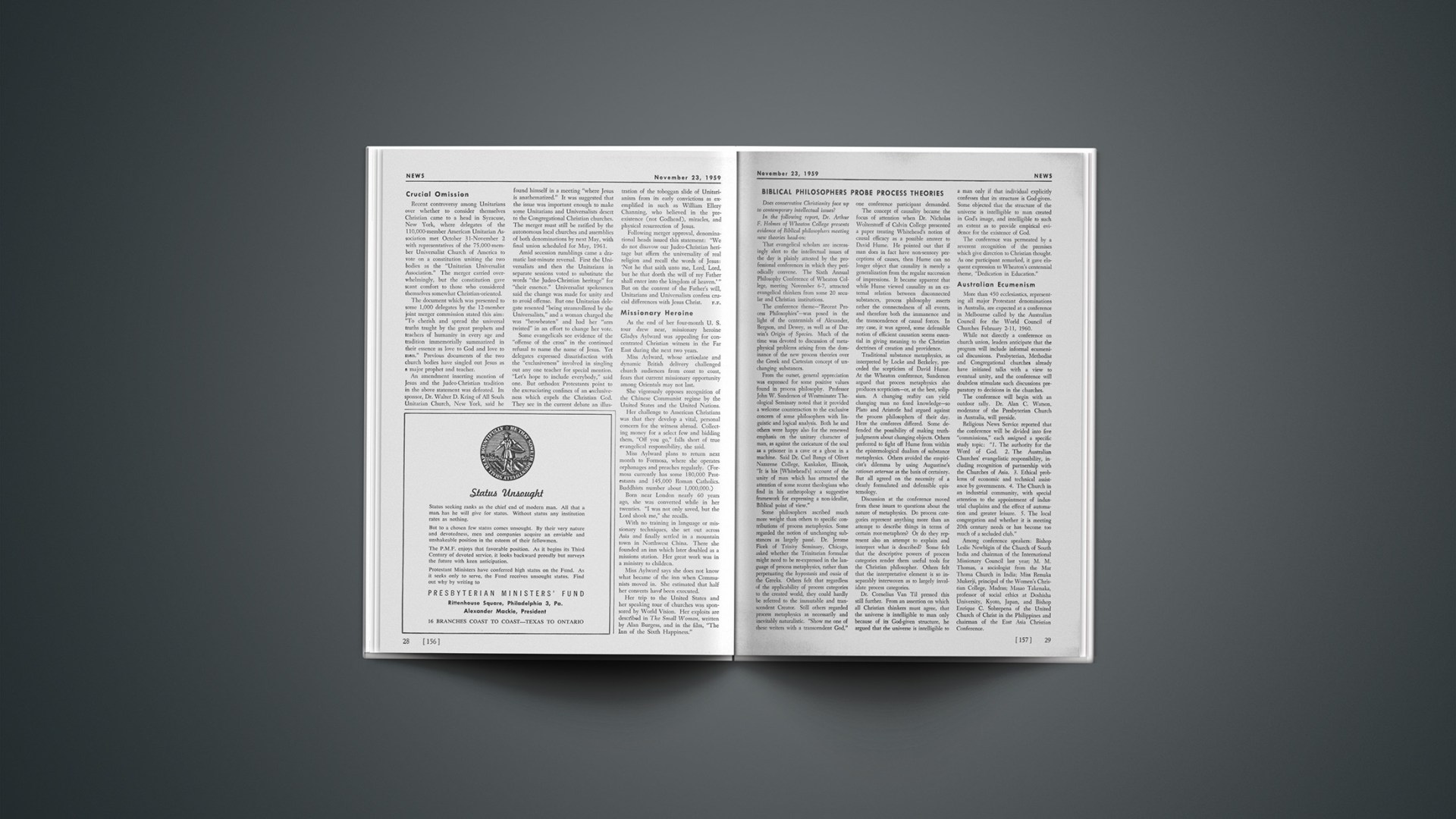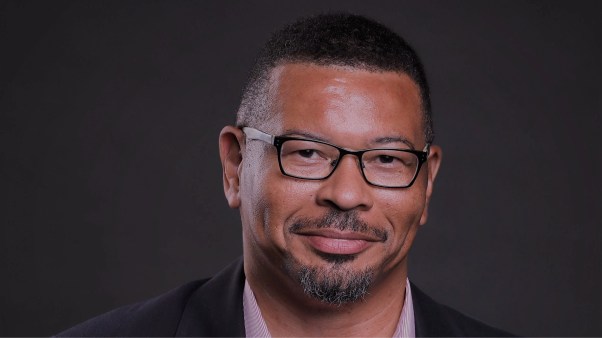Does conservative Christianity face up to contemporary intellectual issues?
In the following report, Dr. Arthur F. Holmes of Wheaton College presents evidence of Biblical philosophers meeting new theories head-on:
That evangelical scholars are increasingly alert to the intellectual issues of the day is plainly attested by the professional conferences in which they periodically convene. The Sixth Annual Philosophy Conference of Wheaton College, meeting November 6–7, attracted evangelical thinkers from some 20 secular and Christian institutions.
The conference theme—“Recent Process Philosophies”—was posed in the light of the centennials of Alexander, Bergson, and Dewey, as well as of Darwin’s Origin of Species. Much of the time was devoted to discussion of metaphysical problems arising from the dominance of the new process theories over the Greek and Cartesian concept of unchanging substances.
From the outset, general appreciation was expressed for some positive values found in process philosophy. Professor John W. Sanderson of Westminster Theological Seminary noted that it provided a welcome counteraction to the exclusive concern of some philosophers with linguistic and logical analysis. Both he and others were happy also for the renewed emphasis on the unitary character of man, as against the caricature of the soul as a prisoner in a cave or a ghost in a machine. Said Dr. Carl Bangs of Olivet Nazarene College, Kankakee, Illinois, “It is his [Whitehead’s] account of the unity of man which has attracted the attention of some recent theologians who find in his anthropology a suggestive framework for expressing a non-idealist, Biblical point of view.”
Some philosophers ascribed much more weight than others to specific contributions of process metaphysics. Some regarded the notion of unchanging substances as largely passé. Dr. Jerome Ficek of Trinity Seminary, Chicago, asked whether the Trinitarian formulae might need to be re-expressed in the language of process metaphysics, rather than perpetuating the hypostasis and ousia of the Greeks. Others felt that regardless of the applicability of process categories to the created world, they could hardly be referred to the immutable and transcendent Creator. Still others regarded process metaphysics as necessarily and inevitably naturalistic. “Show me one of these writers with a transcendent God,” one conference participant demanded.
The concept of causality became the focus of attention when Dr. Nicholas Wolterstorff of Calvin College presented a paper treating Whitehead’s notion of causal efficacy as a possible answer to David Hume. He pointed out that if man does in fact have non-sensory perceptions of causes, then Hume can no longer object that causality is merely a generalization from the regular succession of impressions. It became apparent that while Hume viewed causality as an external relation between disconnected substances, process philosophy asserts rather the connectedness of all events, and therefore both the immanence and the transcendence of causal forces. In any case, it was agreed, some defensible notion of efficient causation seems essential in giving meaning to the Christian doctrines of creation and providence.
Traditional substance metaphysics, as interpreted by Locke and Berkeley, preceded the scepticism of David Hume. At the Wheaton conference, Sanderson argued that process metaphysics also produces scepticism—or, at the best, solipsism. A changing reality can yield changing man no fixed knowledge—so Plato and Aristotle had argued against the process philosophers of their day. Here the conferees differed. Some defended the possibility of making truth-judgments about changing objects. Others preferred to fight off Hume from within the epistemological dualism of substance metaphysics. Others avoided the empiricist’s dilemma by using Augustine’s rationes aeternae as the basis of certainty. But all agreed on the necessity of a clearly formulated and defensible epistemology.
Discussion at the conference moved from these issues to questions about the nature of metaphysics. Do process categories represent anything more than an attempt to describe things in terms of certain root-metaphors? Or do they represent also an attempt to explain and interpret what is described? Some felt that the descriptive powers of process categories render them useful tools for the Christian philosopher. Others felt that the interpretative element is so inseparably interwoven as to largely invalidate process categories.
Dr. Cornelius Van Til pressed this still further. From an assertion on which all Christian thinkers must agree, that the universe is intelligible to man only because of its God-given structure, he argued that the universe is intelligible to a man only if that individual explicitly confesses that its structure is God-given. Some objected that the structure of the universe is intelligible to man created in God’s image, and intelligible to such an extent as to provide empirical evidence for the existence of God.
The conference was permeated by a reverent recognition of the premises which give direction to Christian thought. As one participant remarked, it gave eloquent expression to Wheaton’s centennial theme, “Dedication in Education.”
Australian Ecumenism
More than 450 ecclesiastics, representing all major Protestant denominations in Australia, are expected at a conference in Melbourne called by the Australian Council for the World Council of Churches February 2–11, 1960.
While not directly a conference on church union, leaders anticipate that the program will include informal ecumenical discussions. Presbyterian, Methodist and Congregational churches already have initiated talks with a view to eventual unity, and the conference will doubtless stimulate such discussions preparatory to decisions in the churches.
The conference will begin with an outdoor rally. Dr. Alan C. Watson, moderator of the Presbyterian Church in Australia, will preside.
Religious News Service reported that the conference will be divided into five “commissions,” each assigned a specific study topic: “1. The authority for the Word of God. 2. The Australian Churches’ evangelistic responsibility, including recognition of partnership with the Churches of Asia. 3. Ethical problems of economic and technical assistance by governments. 4. The Church in an industrial community, with special attention to the appointment of industrial chaplains and the effect of automation and greater leisure. 5. The local congregation and whether it is meeting 20th century needs or has become too much of a secluded club.”
Among conference speakers: Bishop Leslie Newbigin of the Church of South India and chairman of the International Missionary Council last year; M. M. Thomas, a sociologist from the Mar Thoma Church in India; Miss Renuka Mukerji, principal of the Women’s Christian College, Madras; Masao Takenaka, professor of social ethics at Doshisha University, Kyoto, Japan, and Bishop Enrique C. Sobrepena of the United Church of Christ in the Philippines and chairman of the East Asia Christian Conference.










